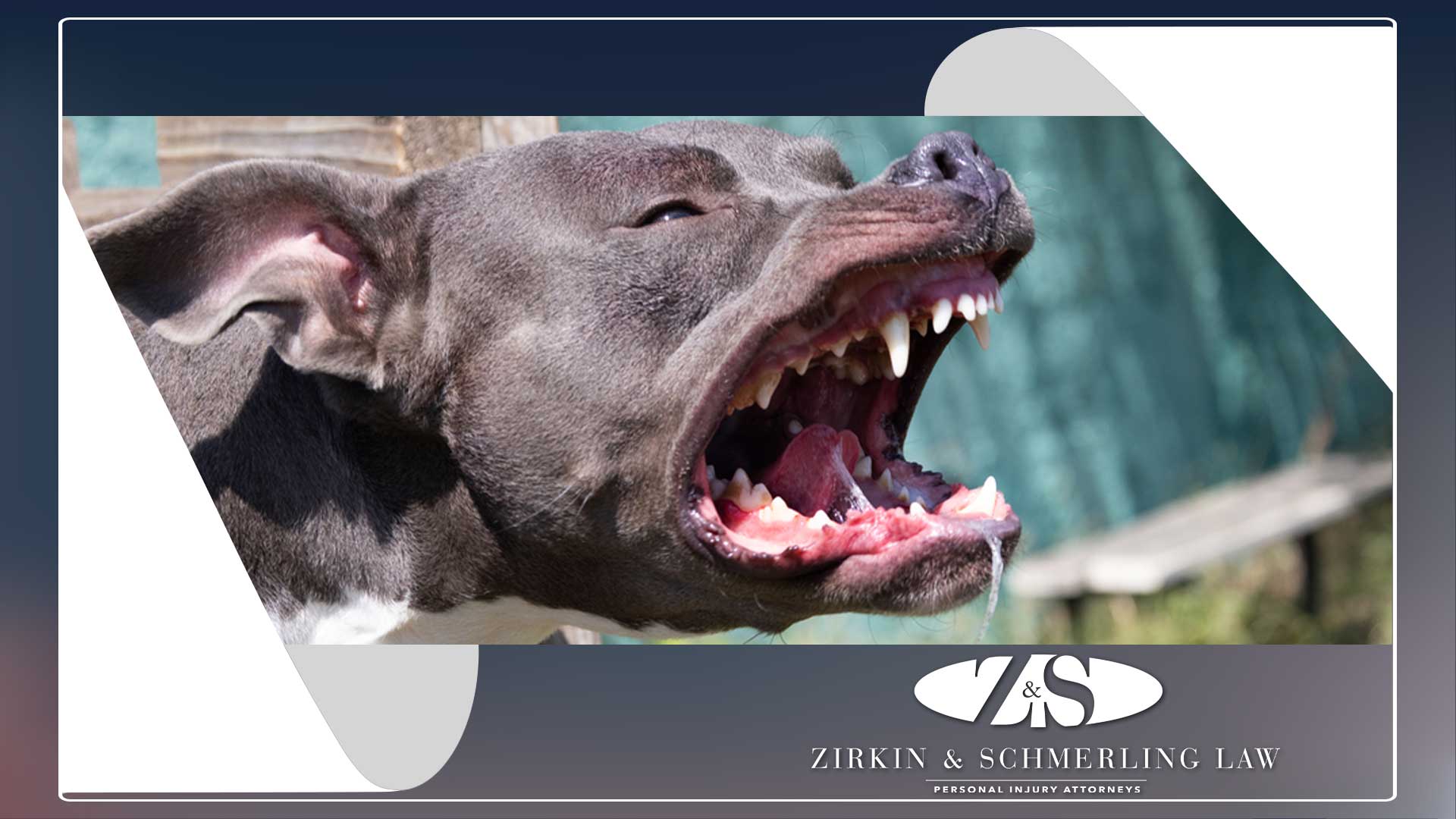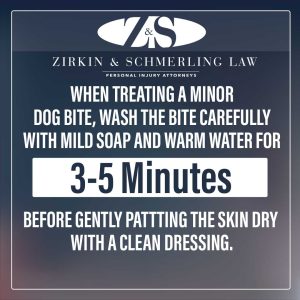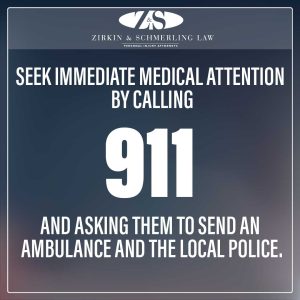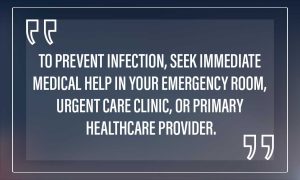
A dog or wild animal attack is traumatic for everyone involved, especially when children are involved. Most animal bites take significant time to heal and can be physically, emotionally, and financially draining. If you’re wondering what to do if bitten by a dog, you are in the right place.
If you or a loved one suffered from a dog bite injury, this article describes the essential steps you should take as soon as possible. Following this advice reduces the chance of developing serious infections, contracting rabies, or forfeiting your legal rights by saying the wrong thing.
Here’s What To Do If You Are Bitten By A Dog
If a dog bites you or a loved one, immediately seek medical attention from your doctor, even if it seems like a minor dog bite. A doctor can properly clean the wound and determine whether or not the dog has rabies or is up to date on its rabies shots.
You should also contact your local Animal Control office to file a report of the animal bite as soon as possible. Animal Control can help you confirm its rabies vaccination status, write up a report of the dog bite, and have additional information about prior dog bites.
Identify the dog’s owner. Collect their name, phone, and address. It’s helpful to note where the owner was during the attack and if they were paying attention to their dog.
Also, ask about the dog’s behavior, rabies vaccinations, previous incidents, or common rabies symptoms, which may provide valuable supporting evidence for your case.
Determine if the dog is up to date on their rabies shot. Requesting proof of the dog’s immunizations and contact information for the veterinarian’s office can help verify the dog’s health status.
The vet can verify the dog’s American Veterinary Medical Association vaccine status.
Take pictures of the animal bite wounds as soon as possible, and continue to document and treat them as they heal. Write down everything you remember about the incident.
Record any new issues after being bitten, including trouble sleeping, physical limitations, or fear of dogs.
Take pictures of where the dog bite occurred. Start by taking photos of the dog (or dogs) involved, including its appearance, size, and distinguishing features like collars or tags. Photograph any relevant environmental factors, such as the incident’s location, signs of negligence, and or witnesses.
Document property damage that occurs from most dog bites, like torn clothing or damaged belongings. Finally, take wide-angle shots to provide context and detail shots for close-ups of animal bite wounds or other evidence.
If you develop an infection later, take photos of the infected area when you remove the dressings to wash the wound with gentle soap. Applying pressure will help if your wound bleeds while changing the dressing.
No matter how thorough your treatment, there’s no way to completely prevent infection, even if you have a robust immune system.
Educate yourself about the signs of infection and call your doctor immediately if you believe infection is occurring.
We help victims after dogs bite. Contact our Dog Bites Law attorney at (410) 753-4611) to schedule a free case evaluation today.
What Type of First Aid Is Recommended For a Minor Dog Bite?
The Centers for Disease Control have established thorough bite wound care protocols due to the high risk of infection. Always seek medical care for any skin-penetrating bite because even the most superficial wound can quickly become infected.
Mount Sinai Hospital recommends the following first aid for stabilizing a minor dog bite injury:

- When caring for someone who has been bitten, staying calm and reassuring is crucial.
- Thoroughly wash your hands with soap and water before touching the affected area.
- Dry your hands on a clean towel or other clean cloth.
- If available, use latex gloves if the wound is bleeding, especially if it is bleeding heavily. This will protect you and reduce the chance of infecting the wound.
- Apply direct pressure with a clean, dry cloth to stop bleeding.
- Wash the bite carefully with mild soap and warm water for 3 to 5 minutes.
- Gently pat the skin dry with a clean dressing.
- If the wound begins bleeding again, apply pressure to the injured area with a clean, dry dressing.
- Rinse with hydrogen peroxide if available.
- Apply antibiotic ointment and cover the wound with a sterile bandage to reduce the risk of infection.
- After treatment, rewash your hands with soap and water and dispose of every dirty or clean bandage that may have come into contact with the injury site.
- To prevent infection, seek immediate medical help in your emergency room, urgent care clinic, or primary healthcare provider.
- Your doctor will assess the bites and create a treatment plan that likely includes a deep clean of the wound, regular dressing changes, antibiotics, and close monitoring of the site.
What To Do If a Dog Bite Causes a Serious, Life-Threatening Injury?

If the wound is on certain areas of vulnerable skin, such as the neck, head, face, hand, fingers, or feet, it can quickly become life-threatening.
- Seek immediate medical attention by calling 911 and asking them to send an ambulance and the local police.
- It’s crucial to stay calm and provide reassurance that help is coming.
- If the wound is bleeding, apply direct pressure to stop bleeding. A clean cloth is preferred, but use what you have.
- Keep the victim safe and maintain pressure until help arrives.
The doctor may order stitches, x-rays, a tetanus shot, prescription antibiotic ointment, intravenous medication, or blood transfusions. In severe cases, extensive surgeries may be needed to repair the bite area.
If the dog’s rabies status cannot be confirmed, prophylactic rabies medication will likely be added to your daily dose of antibiotics.
Should I Talk To The Dog’s Owner?
If you know the individual who owns the dog that attacked you, find out if the animal has a current rabies immunization.
Ask the dog’s owner for the name of their homeowner’s or renter’s insurance carrier. Although they are not obligated to provide this information and may not want to do so, we will receive it during the litigation process.
According to dog bite negligence and strict liability in Maryland, these dog bites are usually covered by their homeowner’s or renter’s insurance.
What Should I Not Do If I Am Bitten By a Dog?

You should never speak to an insurance company or their representative. Inform them that legal counsel will represent you and that they should not contact you again.
Take down the name and number of the insurance company representative who contacted you, but do not speak with them after being bitten by a dog.
Tell the owner that your attorney will be in touch when appropriate, and be sure to read our article about how to choose a dog bite attorney in Maryland. Insurance companies will not try to help you after this kind of incident.
Can I Sue When a Dog Bites Me?
In most Maryland dog bites, the owner may be liable for your injuries. You have the right to pursue a personal injury claim against the dog’s owner for compensation covering expenses related to medical attention from your healthcare provider, lost wages, and related losses.
What if This Is The First Time The Dog Has Harmed Someone?

Maryland’s dog bite laws are stringent, holding owners responsible for preventing dogs from posing a threat after a single dog bite injury. Even if a friend’s dog acts completely out of character and bites you-the owner may be liable.
If pet parents don’t treat their animals humanely or if they encourage aggressive behavior, it can render the owners of the animals liable for financial damages.
Are There Instances Where The Dog Owner Isn’t Liable When Their Animal Bites Someone?
When facing a personal injury claim from a dog bite victim, the owner of the dog (or dogs) may challenge it by presenting one of these defenses:
- The victim provoked the dog (or dogs): In some cases, a dog owner may argue that the victim’s actions or behavior incited the dog to bite. This defense typically relies on evidence demonstrating that the victim engaged in behaviors that agitated or threatened the dog, prompting the attack.
- The victim was trespassing: Another common defense is to assert that the victim was unlawfully on the property where the dog bite occurred. If the victim was trespassing or in an area clearly designated as off-limits to the public, the owner may argue that the victim assumed the risk of receiving a bite from the dog.
- The victim was negligent or aware of the dog’s aggressive tendencies: A dog owner may also seek to challenge a claim by asserting that the victim was negligent in their interactions with the dog or knowingly assumed the risk of injury.
Contact Us For Help With Your Dog Bite Wound Lawsuit
If you or a loved one has been attacked and has animal bites, contact the experienced Maryland dog bite attorneys at the Law Offices of Zirkin and Schmerling immediately at 410-753-4611.
We are here to help you when dog bites occur!
